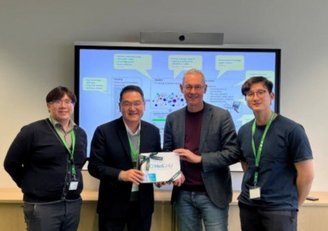The Medical University of Graz (Med Uni Graz), Austria, and Chiang Mai University (CMU), Thailand, have been cooperating in the framework of the ASEA-UNINET since 2009, with a focus on supporting outgoing student mobility for clinical rotations at CMU. To enhance staff mobility and give Thai students from a more disadvantaged financial background the means to come to Graz, Med Uni Graz and CMU have applied for Erasmus+ International Credit Mobility (KA107/171) funds since 2020 which has boosted collaboration in various fields and has led to several reciprocal exchanges of students (clinical rotations, research stays) and staff (teaching and training stays).
In early 2023, a PhD student from CMU’s Department of Community Medicine, Natthanaphop Isaradech, successfully applied for a 2-month Erasmus+ ICM student mobility for traineeships (SMT) in Medical Informatics at Med Uni Graz. The research traineeship was scheduled for 2 October – 1 December 2023. The student, his supervisor at CMU and his (future) supervisor at Med Uni Graz, Prof. Dr. Stefan Schulz, agreed that a longer stay would be more beneficial for all parties involved and looked for funding schemes to support this activity. To find out whether or not a combination of Erasmus+ funding and ASEA-UNINET funding was in accordance with the Erasmus+ ICM as well as the ASEA-UNINET regulations, the International Office Med Uni Graz contacted the respective coordinators at the OeAD who confirmed that such a combination of funding schemes would be possible as long as there would not be any double-funding, i.e. costs for the same activity would be funded twice. In the ASEA-UNINET project call 10/2023 – 09/2024, Prof. Schulz applied for funding for the project “A development and validation study of clinical named entity recognition using pre-trained deep learning models in discharge summary notes from Chiang Mai tertiary care hospital” and his application was successful.
In agreement with his supervisor, the student stayed for an additional two weeks at Med Uni Graz (self-funded) before going back home in mid-March 2024.
The International Office perspective:
From the International Office Med Uni Graz’s perspective, the organization of the stay went smooth and without any challenges. The International Office was involved and aware of the plans of a longer stay instead of a 2-month stay (provided that the ASEA-UNINET application would be successful) right from the beginning and was therefore able to consider implications of a longer stay right from the beginning. To give the student appropriate advice on visa and insurance matters, the International Office consulted with Ms. Christina Düss from the OeAD Regional Office Graz and the student was informed that a Visa D would be applicable for a stay of up to 6 months. Unfortunately, the International Office only found out that the student had initially planned and booked flights/accommodation for a stay that was longer than 6 months after his stay had ended and was therefore unaware of the inconveniences that the student encountered with re-booking flights/accommodation and unable to provide support with this matter.
Like all incoming exchange students to Med Uni Graz, the student was enrolled at Med Uni Graz and through enrollment covered with accident and liability insurance through the Austrian student union during his whole stay. Furthermore, all incoming students within the framework of Erasmus+ International Credit mobility receive comprehensive international health insurance coverage (paid from Erasmus+ OS funds) for the period of the Erasmus+ mobility. For the remaining time period, the student was informed that he was responsible for international health insurance and purchased insurance himself. The student did not ask for any assistance from the International Office in matters such as visa, insurance etc.
While the student received the Erasmus+ funding from the International Office, the International Office was not involved with the ASEA-UNINET funding. The student received the ASEA-UNINET funding from the OeAD Regional Office Graz.
The student’s perspective:
I am incredibly grateful to the Postgraduate unit of Chiang Mai University, Erasmus+, and the ASEA-UNINET for providing me with this opportunity to collaborate on research at the Medical University of Graz, Austria from 2nd October, 2023 to 19th March, 2024. I appreciate Professors Schulz and Kreuzthaler for their warm hospitality in Graz and their ongoing mentorship during my research stay which has been invaluable. Special thanks to Iris and Eva from the International Office Med Uni Graz for their exceptional support, which made the funding and administrative processes seamless.
The funding process was very smooth. Iris and Eva from Medical University of Graz, and Christina from the OeAD Regional Office Graz provided excellent assistance, making the paperwork straightforward and hassle-free. One significant challenge I encountered was choosing the appropriate visa type for my stay. Initially, I planned to be in Graz for about 186 days, which would have required a residence permit visa. This type of visa involves extensive documentation, and I was unaware of the requirements at the time. To avoid delays and complications, I had to adjust my stay, rebook my flights and Airbnb to shorten the duration to under 180 days, allowing me to apply for a standard visa type D instead. This involved two trips to Bangkok for visa applications. Thankfully, everything worked out in the end. However, based on my experience, I would suggest offering visa consultations for students to help them navigate these complexities and avoid similar issues.
In terms of research, my experience was incredibly positive. I gained valuable knowledge from Professor Schulz and Kreuzthaler on health-care terminology standards and natural language processing in medicine, which significantly advanced my PhD thesis work. I think everything was perfect during my time in Graz. Besides my studies, I also got a chance to explore Austria's beautiful scenery, amazing art and impressive architecture. Living in Graz gave me a fantastic chance to travel around Europe and learn about all the different cultures. I'm very thankful for this experience and confident that the work I and the professors contributed will have a positive impact in healthcare improvement.

